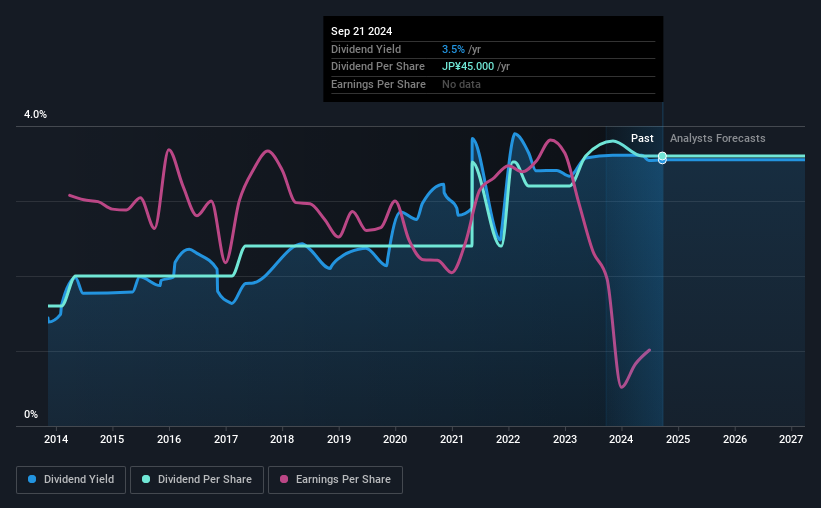Nippon Kayaku Co., Ltd. (TSE:4272) has announced that it will pay a dividend of ¥22.50 per share on the 2nd of December. The dividend yield will be 3.5% based on this payment which is still above the industry average.
View our latest analysis for Nippon Kayaku
Nippon Kayaku's Projections Indicate Future Payments May Be Unsustainable
We like to see robust dividend yields, but that doesn't matter if the payment isn't sustainable. Prior to this announcement, the company was paying out 148% of what it was earning and 95% of cash flows. While the cash payout ratio isn't necessarily a cause for concern, the company is probably focusing more on returning cash to shareholders than growing the business.
Earnings per share is forecast to rise by 34.3% over the next year. However, if the dividend continues along recent trends, it could start putting pressure on the balance sheet with the payout ratio reaching 117% over the next year.

Dividend Volatility
Although the company has a long dividend history, it has been cut at least once in the last 10 years. Since 2014, the annual payment back then was ¥20.00, compared to the most recent full-year payment of ¥45.00. This implies that the company grew its distributions at a yearly rate of about 8.4% over that duration. A reasonable rate of dividend growth is good to see, but we're wary that the dividend history is not as solid as we'd like, having been cut at least once.
Dividend Growth Potential Is Shaky
With a relatively unstable dividend, it's even more important to evaluate if earnings per share is growing, which could point to a growing dividend in the future. Over the past five years, it looks as though Nippon Kayaku's EPS has declined at around 17% a year. Such rapid declines definitely have the potential to constrain dividend payments if the trend continues into the future. On the bright side, earnings are predicted to gain some ground over the next year, but until this turns into a pattern we wouldn't be feeling too comfortable.
The Dividend Could Prove To Be Unreliable
In summary, while it's good to see that the dividend hasn't been cut, we are a bit cautious about Nippon Kayaku's payments, as there could be some issues with sustaining them into the future. The payments are bit high to be considered sustainable, and the track record isn't the best. We would probably look elsewhere for an income investment.
Market movements attest to how highly valued a consistent dividend policy is compared to one which is more unpredictable. Meanwhile, despite the importance of dividend payments, they are not the only factors our readers should know when assessing a company. To that end, Nippon Kayaku has 3 warning signs (and 1 which is a bit unpleasant) we think you should know about. Is Nippon Kayaku not quite the opportunity you were looking for? Why not check out our selection of top dividend stocks.
Valuation is complex, but we're here to simplify it.
Discover if Nippon Kayaku might be undervalued or overvalued with our detailed analysis, featuring fair value estimates, potential risks, dividends, insider trades, and its financial condition.
Access Free AnalysisHave feedback on this article? Concerned about the content? Get in touch with us directly. Alternatively, email editorial-team (at) simplywallst.com.
This article by Simply Wall St is general in nature. We provide commentary based on historical data and analyst forecasts only using an unbiased methodology and our articles are not intended to be financial advice. It does not constitute a recommendation to buy or sell any stock, and does not take account of your objectives, or your financial situation. We aim to bring you long-term focused analysis driven by fundamental data. Note that our analysis may not factor in the latest price-sensitive company announcements or qualitative material. Simply Wall St has no position in any stocks mentioned.
About TSE:4272
Nippon Kayaku
Engages in mobility and imaging, fine chemicals, and life sciences businesses in Japan.
Excellent balance sheet average dividend payer.
Market Insights
Community Narratives




